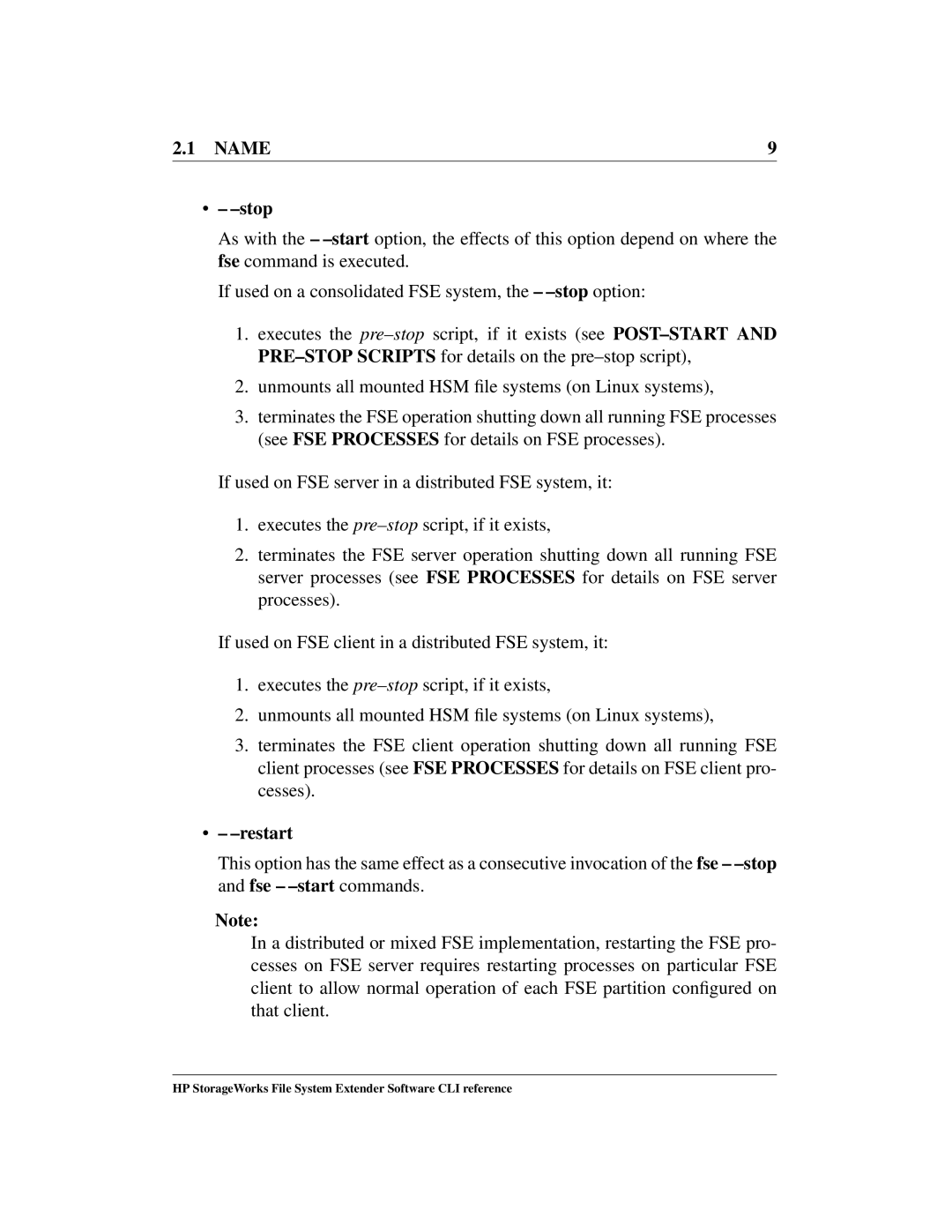File System Extender Software
Contents
FSE command index
VolumeName
Synopsis
Description
Name
Partition Manager S Back End Agent S Library Agent S
Process FSE Daemon Service
POST-START and PRE-STOP Scripts
FSE administrator can set up two
Command fse -dismount-ntfs
Fse -mount command. If
Start
Options
Restart
Name Stop
Name Status
VolumeName
MountPoint
Dismount-ntfs
Limit-access
Full-access
List-volumes
Examples
\fs02
0050da45607 \
Fse -list-volumes -detail Files
See Also Fsesystem8, fsepartition8, fserestore8, fseintro7
Copyright
BackupFileName -m- -medium Barcode
BackupFileName -nomedia
Name
Name
Name
Name Hsmlvvar = hsmvg/var
Hsmlvpart = hsmvg/part
Snapshotpct =
BackupFileName
Medium
Name Nomedia
Barcode
Init
Fsebackup -file .- -nomedia
Fsebackup -fbackupimagefile.tar.bz2
Fsebackup -f /mnt/backup/backupimagefile.tar.bz2 -nomedia
Fsebackup -medium bkpmed02
Name Files
See Also Fserestore8, fserecover8, fseintro7
Fsebak -suspend Fsebak -continue
Fsebak
Fsebak -h
Fsebak Version
Resuming Normal FSE System Operation fsebak -continue
Achieving the FSE Database Consistency fsebak -suspend
Suspend
Continue
StatusCode
See Also Fse8, fsesystem8, fseintro7
Fsecheck -i -fsc-hsmfs PartitionName Fsecheck -m
Fsecheck
Barcode Barcode
Match-media
Fsc-hsmfs
LOG Consistency
PartitionName
Name Fsc-media
Alog Consistency
Autocorrect
Fsecheck -fsc-hsmfs dailyreports
Name Volume
Fsecheck -fsc-media archivepart32
Fsecheck -fsc-media -autocorrect
Fsecheck -fsc-media -barcode 000101 000102 dm002
See Also fserecover8, fseintro7
Name
Add ConfigFileName
ConfigFileName
Add
Remove
Name
RevisionNumber
Name Show
History
List
Disable
Enable
Name Detail
DriveAB -F
Libdrive01
See Also Fse8, fselibrary8, fsemedium8, fsepool8, fseintro7
PartitionName FileID... -date
FileName... -D
Path
FileName
Name
FileName
Size
List option Detail
FileID
Name History
IdPartitionName FileID... argument combination
Utf8
InputFile
Migid
Name Date
Into
Migrate
Trigger-deletion
Release
No-monitor
Fsefile -list updateMe.gz -detail
Toring
Fsefile -list file1 file2 file3 -size
Fsefile -recall -if
Fsefile -recall -if RecallFileList.txt -utf8
Fsefile -recall
FSEPartition010 30600 -date 2002/12/10
Fsefile -trigger-migration
Fsefile -Sweek50 week51 /mnt/fsevg/weekly-archives/week52
Partition03
Fsefile -trigger-deletion partitiondeleteme -F -no-monitor
JobID
Priority JobID Number
Decr Number
HP StorageWorks File System Extender Software CLI reference
Migration List migration jobs Recall List recall jobs Admin
Recovery List recovery jobs
JOB List Information
JobID
Name Maint
Abort
Priority
Decr
Name Incr
Fsejob -list -migration -recall
Fsejob -l -A partitionnew -D
See Also Fsesystem8, fsepartition8, fsefile 8, fseintro7
Fsejob -p20021206000614
Name ConfigFileName
Name RevisionNumber -H- -history
Name of the FSE library configuration file to use
Name of the FSE library to manage configuration for
Name List
UnloadNr
Show-inventory
Rescan
LibraryName
Fselibrary -r libsupplemental -force
Name Enable
Fselibrary -show systemlib
Fselibrary -showmainlibrary storagelibrarycfg.fse
Disable the FSE library named AITlibrary skip confirmation
Fselibrary -update-inventory libemail -rescan
Fselibrary -disable AITlibrary -force
Enable the currently disabled FSE library named LTOlibrary
HP StorageWorks File System Extender Software CLI reference
Barcode
Description
Options
PoolName
Name Pool
Name
Format
Command fsemedium -list -volume
Mark-unreliable
Name If -remove ,- -mark-unreliable ,- -mark-unusable
Close-volume
Mark-unusable
Mark-good
Recreate-fri
Copy-contents
Duplicate
Reorg
Fsemedium -abackuptape10 -poolpoolbkp
Fsemedium -add backuptape05
Fsemedium -rbackuptape13
Fsemedium -r backuptape78 -F
Fsemedium -close-volume ait60
Fsemedium -init tape4a -volume 1 -no-monitor
Fsemedium -format work35 -F -init
Fsemedium -i workoffline45 -force
Fsemedium -reorg tape56 -volume 1 2 5
Fsemedium -copy-contents damagedmed
Fsemedium -reorg tape55 -no-monitor
Fsepartition Version
Fsepartition -h
Name
Partition status information that is
Partition Status Information
Status HSM FS Partition PART. Manager Normal
Options Add
Name of the FSE partition configuration file to use
Or -disable option Show
Detail
ExpirationDate
Reorg-scan
NumberOfGenerations
Reorg-stat
Fsepartition -addclient02part05.fse
SlackThreshold%
Fsepartition -r client03part03 -force
Fsepartition -show client01part02
Fsepartition -status mailpartition01
Fsepartition -disable client03astropics -F
Fsepartition -reorg-scanverytemporarypart 2003/09/20 100000
Fsepartition -reorg-stat client03astropics Files
Opt/fse/newconfig/fse-partition-NEVER-RELEASE.cfg
Copyright C 2002-2005 Grau Data Storage
Fsepool -a
Fsepool
Fsepool -r
Fsepool -s
Name
Name Options Add
Name History
Name Detail
Fsepool -remove systembackuppool -F
Fsepool -show projarchivepool -H
Fsepool -l -D
Opt/fse/newconfig/fse-pool-AIT-MANY-SMALL-FILES.cfg
InstallPath% \newconfig \fse-pool-AIT-MANY-SMALL-FILES.cfg
HP StorageWorks File System Extender Software CLI reference
Fserecover
Fsejob -a JobID
Var/opt/fse/tmp/.PartitionNamehsmfsrecover
Limitations
Fserecover -hsmfs fsefs01
Fserecover -fsc fsefs01
Options Fsc
Hsmfs
Name 100 See Also Fsecheck8, fsepartition8, fseintro7
file BackupFileName
Restore Concepts
Fserestore copies the backup image from the spec
Name 102
Options file
Name 103
Name 104 Device
Offset
Count
Name 105 Retrieve-to
Fserestore file
Fserestore -d /dev/sg3-o 3 -count 2 -retrieve-to /tmp
Fserestore -d id0200 -offset
Name 106
Dev/sg5
Name 107
See Also Fse8, fsebackup8, fserecover8, fseintro7
Fsesystem
Name 108
Name 109
Status Partition PART. Manager HSM FS Error
Options Show
Name 110
Name 111
Enable-dbg
Status Information
SysDbgLevel
Name 112
SysDbgFile
SysDbgFlags
Disable-dbg
Name 113
SysDbgHSMFS
Name 114 Help
Fsesystem -show fseconfig.fse
Fsesystem -mfseconfignew.fse
See Also Fse8, fsejob8, fsepartition8, fseintro7
Name 115
